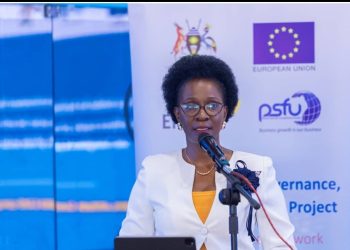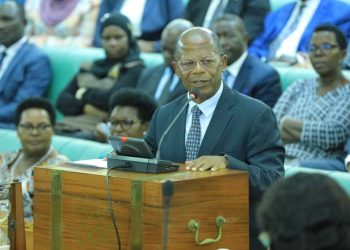Journalists, voters, and candidates will not be allowed to use any recording devices such as phones and cameras inside a polling station if a proposal by the Electoral Commission (EC) to ban the use of such devices during voting is adopted by Parliament.
The electoral body also wants all people planning to stand for any public office that requires a certain level of education such an O’level or A‘level certificate, to have their academic papers certified by the Uganda National Examination Board (UNEB) before they can be nominated.
These among other controversial proposals were presented yesterday before Parliament’s committee on legal and parliamentary affairs, by Justice Simon Mugenyi Byabakama, the EC chairperson.
The EC wants the proposals captured as amendments to the Presidential Elections (Amendment) Bill 2019, currently before the committee.
Defending the proposed amendment, Byabakama told the MPs that the proposal is aimed at protecting the privacy of voters who may want to cast their ballot in secrecy without having their pictures taken or recorded on video.
A person who contravenes this provision commits an offense and is according to the EC, liable, on conviction, to a fine not exceeding 40 currency points (sh800,000) or imprisonment not exceeding two years or both.
In their proposals, EC also wants the Presidential Elections Act amended for a new provision that provides for early voting by persons in institutions such as security agencies among other institutions that are engaged in the administration of elections.
In July, the Government, through the Attorney General, William Byaruhanga, tabled before Parliament five electoral reforms Bills, including the Presidential Elections (Amendment) Bill No.17, 2019 and the Parliamentary Elections (Amendment) Bill No.18, 2019.
The others were the Electoral Commission (Amendment) Bill No. 19, 2019, the Political Parties and Organisations (Amendment) Bill No. 20, 2019 and the Local Governments (Amendment) Bill No.21, 2019.
The Bills were then forwarded to the legal and parliamentary affairs committee for scrutiny. Upon their tabling, the Government disowned some of the provisions such as ban on the use of cameras and early voting, which had been captured by the media as part of the proposals in the Bills it had tabled before Parliament.
MPs, however, opposed the ban on the use of recording devices inside a polling station. The legislators also opposed the idea of allowing security personnel to vote earlier, saying it would encourage rigging.
“Vote rigging takes place inside and not outside of a polling station. We are more interested in what is happening inside a polling station. The day you will ban the use of cameras inside a polling station, you will have disabled journalists who use cameras to do their work; this offends transparency,” Abdul Katuntu (Bugweri) said.
Aston Kajara (Mwenge County) asked:
“It will be unprofessional for you to ban cameras during voting. How will people collect the evidence that they may want to present to court?” In response, EC commissioner Justine Ahabwe Mugenyi said those who use cameras infringe on the rights and privacy of voters.
“Even if it were you, you would not be comfortable when your picture is taken when ticking a candidate of your choice. These pictures end up on social media and people’s privacy is invaded,” she said.
The MPs also opposed the proposal that seeks to empower EC to ban candidates from campaigning, should they abuse the 7:00 am to 6:00 pm campaign time provision, arguing that they should only introduce a fine.





























































